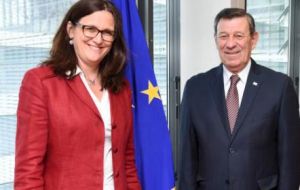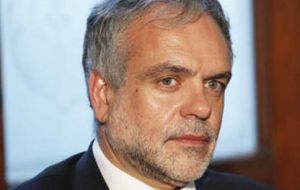MercoPress. South Atlantic News Agency
Uruguay in Brussels to begin a crucial round of Mercosur/EU negotiations
 Nin Novoa has a meeting scheduled with EU Trade Commissioner Cecilia Malmström and is expected to agree on dates for the formal exchange of proposals
Nin Novoa has a meeting scheduled with EU Trade Commissioner Cecilia Malmström and is expected to agree on dates for the formal exchange of proposals  Uruguay Deputy Minister Cancela said the proposal to allow accords with third countries will be ready in time for the next Mercosur summit
Uruguay Deputy Minister Cancela said the proposal to allow accords with third countries will be ready in time for the next Mercosur summit Uruguay Foreign Minister Rodolfo Nin Novoa is scheduled to begin this Friday in Brussels what is believed to be the last round of talks with the European Union to reach a wide ranging cooperation and trade agreement between Mercosur and the European Union.
Nin Novoa has a meeting scheduled with EU Trade Commissioner Cecilia Malmström and is expected to agree on dates for the formal exchange of proposals between the two blocks on tariff reductions and a timetable for their implementation.
Uruguay currently holds the rotating chair of Mercosur, and is encouraged by what has been described as the new spirit or consensus in the block, since the change of government in Argentina.
“Mercosur has seen a significant change after the change of administration in Argentina,” Nin Novoa said in an interview with Deutsche Welle in Germany. “Mauricio Macri’s victory has favored the trade negotiations with the European Union”, contrary to what was the position under ex president Cristina Fernandez who privileged the domestic market and Argentine jobs.
Mercosur and EU officially re-launched trade negotiations at a summit in Madrid on May 2010 and since then the objective of the two blocs has been to negotiate a comprehensive deal. Negotiations have been hard-fought because both sides want to make sure the deal includes everything from industrial goods and agricultural production to services and intellectual property. Some of these issues are highly sensitive for different interests in both blocks and are lobbying strongly.
Before arriving in Belgium, Nin Novoa visited Germany seeking to schedule a trip of German President Joachim Gauck to Montevideo.
In this new scenario Uruguay also proposed a move that could prove contentious among its member associates. In effect the administration of president Tabare Vazquez anticipated that in the coming summit, next June/July, it will file a proposal to change the bloc’s regulations and allow countries to negotiate bilateral trade agreements with non-member countries.
The case refers to Mercosur resolution 32/00 at the time proposed by Argentina and sponsored by Brazil which demands a Mercosur unanimous consensus for any member wishing to reach agreements with third countries.
Uruguay Deputy Foreign Minister José Luis Cancela said the proposal will be ready in a few months time in order to change the Asunción Treaty — which gave birth to the bloc in 1991. The objective will be to allow countries to move forward with individual trade deals in case Mercosur chooses not to do so as a unified bloc.
The Vázquez administration is seeking to follow the same model used by Uruguay with its current free-trade agreement with Mexico, signed 12 years ago. Back then, Uruguay was authorized as an exception by the rest of the bloc members to sign the deal, leaving the door open for Brazil, Argentina and Paraguay to join later when they see it convenient.
Such a reform of the Mercosur bloc would allow Uruguay to deepen its ties with Mexico and seek a deal with the Pacific Alliance, Japan and China — objectives set by Nin Novoa, who two weeks ago had anticipated Uruguay’s move.
“We don’t want to erase Mercosur’s regulations, we want to change them. We set a precedent with our deal with Mexico, we could make trade rules more flexible,” he said. “The mechanism would be signing a frame work deal with the whole bloc and then allow countries to do further negotiations.”
This isn’t the first time Nin Novoa and other Uruguay government officials complained about the current status of the Mercosur bloc. The foreign minister has often backed the idea of a two-track negotiation with the EU to speed the process, a mechanism he now wants to implement for other deals.
Mercosur senior members Argentina and Brazil, repeatedly blocked the Uruguayan attempt but things have changed since last year. Argentina is ruled by pro-business president Mauricio Macri, and Brazil's recession is forcing the country's main pressure groups, industry and agriculture, to review the policy of geared subsidies and protection to the different sectors, because this has affected competitiveness and scared foreign direct investors, plus promoting financial speculation, while commodities ´prices were booming.




Top Comments
Disclaimer & comment rulesCommenting for this story is now closed.
If you have a Facebook account, become a fan and comment on our Facebook Page!